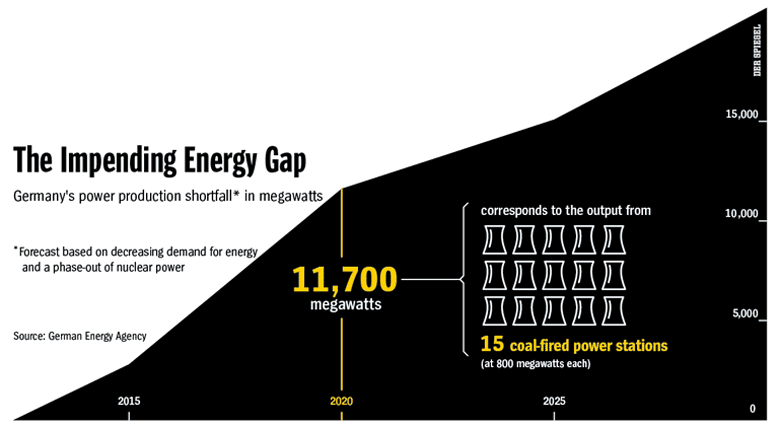Germany’s Energy Gap
April 24th, 2008Posted by: Roger Pielke, Jr.

Der Spiegel has an excellent article on the future of Germany’s energy supply. Even with projections of a falling population, Germany has a looming gap between the energy it needs and the energy it projects to be available. Why is this? According to the article:
Nuclear power is too dangerous. Coal is too dirty. Gas involves too much dependence on Russia. And renewables are insufficient. So just where is Germany going to get its power from?
How did Germany, with its forward-thinking renewable policies and ecologically sensitive populace, get into this situation?
The problem is that up until now the Germans have been too passive in working towards achieving an energy supply that satisfies all requirements; in other words, one that is environmentally friendly, safe and cost-efficient at the same time. They have chosen to fritter away the fruits of their prosperity on day-to-day problems instead of investing them in intelligent preparations for the future — in other words, in energy research.
In fact, Germany actually offers the ideal conditions to achieve even more impressive technological advances than in the past. The Karlsruhe Institute of Technology (KIT), with its 7,500 staff, is a perfect illustration of this potential.
Engineers on the campus of the KIT are testing, for example, a prototype system that converts straw into fuel. In another lab, engineers are developing a highly efficient geothermal power plant, and in yet another, physicists are building giant magnets for the experimental ITER fusion reactor to be based in France.
Everywhere at KIT, solutions are being developed which will not only help Germany, but also the rest of the world, to overcome the most serious energy problems. But the engineers and scientists at the Karlsruhe technology park sense — precisely because they are so ambitious — the limits of what they can do. Peter Fritz, the institute’s head of research, says that the threat of an energy gap in Germany is not the only reason that “a great deal of know-how and money needs to be mobilized very quickly.”
In comparison to the size of the problem, energy research in Germany has tended until now to be somewhat relegated to the sidelines. But it is also a decisive weak point, including in the debate over the expected power shortfall. This is because cutting-edge research offers the best way to limit the costs associated with a massive expansion of renewable energy.
From a global perspective, government research expenditures have hardly increased since the early 1970s, and the situation is especially bleak in Germany. After the 1973 oil crisis, annual expenditures for energy research, adjusted for inflation, were almost doubled to €1.5 billion ($2.37 billion). But then, as the pressure of high oil prices subsided, research budgets were gradually reduced before reaching a record low of just under €360 million ($569 million) in 2001.
Energy research budgets have gone up again since then, but far too slowly. Ironically, the grand coalition makes no secret of its pride in having brought the government’s energy research budget back up to above €500 million ($790 million).
KIT research director Fritz isn’t surprised that so many important questions still haven’t been answered, including the issue of long-term storage of nuclear waste. “It is critical that we bring expenditures back up to €1.5 billion ($2.37 billion),” he says, and he even has a provocative idea to offer: “The government should sell extended operating periods for German nuclear power plants at auction and invest the proceeds in research.”
It’s a provocative idea: Use yesterday’s dirty technology to make a clean future possible? Nuclear money for the great efficiency revolution?
Even Foreign Minister Steinmeier, the architect of Germany’s nuclear phase-out, sometimes succumbs to temptation. “Longer operating lives for nuclear power plants would certainly be the easier approach,” he says, but adds: “However, accelerated technology development is much better in the long run and provides us with new export markets.”
There is a technology policy lesson for the U.S. to be learned in Germany’s energy policies. Specifically, yes do everything that you can in the short-term to make energy more secure, more efficient, and more clean — and above all, available. But don’t forget that to invest in innovation, lest you find yourself in an impossible situation.